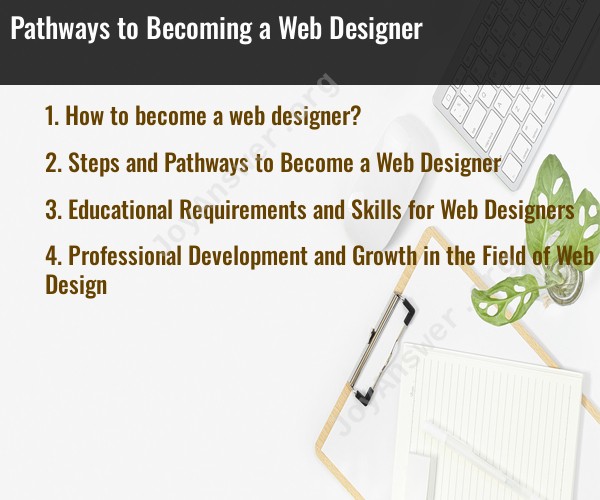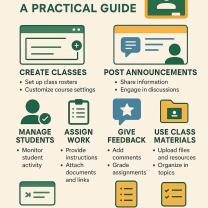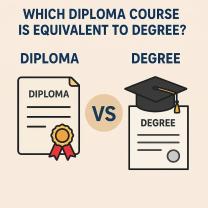How to become a web designer?
Becoming a web designer involves a combination of education, skills development, and practical experience. Here's a step-by-step guide on the pathways to becoming a web designer:
Educational Background:
High School Education:
- Start by obtaining a high school diploma or its equivalent. Courses in art, computer science, and mathematics can be beneficial.
Consider a Relevant Degree:
- While a formal degree is not always required, many web designers have a bachelor's degree in a related field. Common degrees include Web Design, Graphic Design, Computer Science, or Information Technology.
Alternative Paths:
- Some individuals enter the field without a traditional degree. Self-taught designers or those who attend coding bootcamps can also build the necessary skills for a career in web design.
Develop Key Skills:
Learn Design Principles:
- Familiarize yourself with fundamental design principles, including layout, color theory, typography, and composition.
HTML and CSS:
- Gain proficiency in HTML and CSS, which are essential for structuring and styling web content.
Graphic Design Tools:
- Learn how to use graphic design tools such as Adobe Creative Suite (e.g., Photoshop, Illustrator) or other design software.
Responsive Design:
- Understand the principles of responsive web design to create websites that work well on various devices and screen sizes.
JavaScript (Optional):
- While not always required for all web design roles, learning JavaScript can enhance your skill set, especially if you want to work on the interactive aspects of web design.
Build a Portfolio:
- Create a portfolio showcasing your web design projects. Include a variety of examples to demonstrate your skills, style, and versatility. This portfolio is essential for showcasing your work to potential employers or clients.
Gain Practical Experience:
Internships or Entry-Level Positions:
- Look for internships or entry-level positions in web design to gain practical experience. This could involve working with a design agency, a tech company, or within an in-house design team.
Freelance Work:
- Consider taking on freelance projects to build your portfolio and gain real-world experience. Freelancing allows you to work on diverse projects and develop client communication skills.
Stay Updated and Specialize:
- The field of web design is dynamic, and staying updated on industry trends and technologies is crucial. Consider specializing in areas such as user experience (UX) design, e-commerce design, or mobile app design based on your interests.
Networking:
- Attend industry events, join online communities, and network with other web designers. Networking can provide valuable insights, mentorship, and potential job opportunities.
Continuous Learning:
- Web design tools and technologies evolve, so commit to continuous learning. Explore online courses, attend workshops, and consider obtaining certifications to enhance your skills.
Job Search and Apply:
- Start your job search by applying to positions that align with your skills and interests. Tailor your resume and portfolio to highlight relevant experiences.
Prepare for Interviews:
- Be prepared for interviews by reviewing common web design interview questions and showcasing your problem-solving and design-thinking skills.
Remember that web design is a creative field, and your portfolio and practical skills often carry more weight than formal education alone. Whether you pursue a traditional degree or take an alternative path, building a strong portfolio and continuously improving your skills are key to a successful career in web design.
Steps and Pathways to Become a Web Designer:
The path to becoming a web designer can be customized to your individual learning style and career goals. Here are some potential steps:
Education and Skill Development:
- Formal Education: Earn a bachelor's degree in web design, graphic design, computer science, or a related field. Consider associate's degrees or bootcamps for faster and more practical skills training.
- Self-Directed Learning: Take online courses and tutorials in web design, coding languages, and design software. Participate in open-source projects and personal projects to build your skills and portfolio.
- Bootcamps and Intensive Programs: Immerse yourself in intensive web design or coding bootcamps to gain practical skills and portfolio development guidance in a short timeframe.
Portfolio Building and Experience:
- Personal Projects: Design mockups, websites for yourself or friends, or contribute to open-source projects to showcase your creativity and technical abilities.
- Freelance Work: Start small with freelance projects to gain practical experience and client interaction. Build your portfolio through successful client work.
- Internships and Volunteering: Seek internships at web design agencies or volunteer for non-profit organizations to gain real-world experience and build connections.
Networking and Community Engagement:
- Connect with other web designers: Attend industry events, conferences, and online communities to network, learn from peers, and stay updated on industry trends.
- Build your online presence: Create a professional online portfolio website or platform to showcase your work and attract potential employers or clients.
- Stay active on social media: Engage with design communities, share your work, and contribute to online discussions to establish yourself as a professional.
Remember: There's no single "right" path. Consider your budget, learning style, time constraints, and career goals to choose the education and experience pathways that best suit you.
Educational Requirements and Skills for Web Designers:
While formal education isn't always mandatory, specific knowledge and skills are crucial for success in web design:
Essential Skills:
- Visual Design: Strong understanding of design principles, typography, color theory, and layout composition.
- Front-End Development: Coding skills in HTML, CSS, and JavaScript are fundamental. Expertise in frameworks like React, Angular, or Vue.js can be an advantage.
- User Experience (UX): Ability to understand user needs, conduct user research, and design intuitive and user-friendly interfaces.
- Problem-Solving and Critical Thinking: Analyze challenges, find creative solutions, and adapt to changing technologies and client needs.
- Communication and Collaboration: Work effectively with clients, other designers, and developers to deliver projects successfully.
Additional Skills:
- Motion Graphics and Animation: Adding animation and dynamic elements can enhance your designs.
- Accessibility: Knowledge of accessibility guidelines to ensure websites are usable for everyone.
- Content Management Systems (CMS): Understanding of popular CMS platforms like WordPress or Drupal can be beneficial.
- Marketing and Branding: Knowledge of branding principles and online marketing can make you a well-rounded web designer.
Remember: Continuous learning and upskilling are vital in this fast-paced field. Embrace technology advancements, experiment with new tools, and stay updated on design trends to maintain your competitive edge.
Professional Development and Growth in the Field of Web Design:
Web design offers constant opportunities for professional development and growth:
- Specialization: Deepen your expertise in a specific area like UX/UI design, front-end development, or e-commerce design to advance your career.
- Leadership and Management: Consider managing web design teams or projects, transitioning to creative director roles, or leading client relationships.
- Entrepreneurship: Start your own web design agency or freelance business, leveraging your skills and experience to build your own brand.
- Education and Consulting: Share your knowledge through teaching web design courses, workshops, or providing consulting services to other businesses or individuals.
- Stay Involved in the Community: Contribute to open-source projects, speak at conferences, or mentor aspiring web designers to give back to the community and stay connected with the latest trends.
By actively seeking new challenges, embracing continuous learning, and nurturing your skills, you can unlock exciting career advancement opportunities and build a long-lasting and fulfilling career in the dynamic world of web design.
Feel free to ask further questions about specific skills, educational options, or career development strategies within web design. I'm here to support your journey and help you navigate your path to success in this creative and evolving field!













